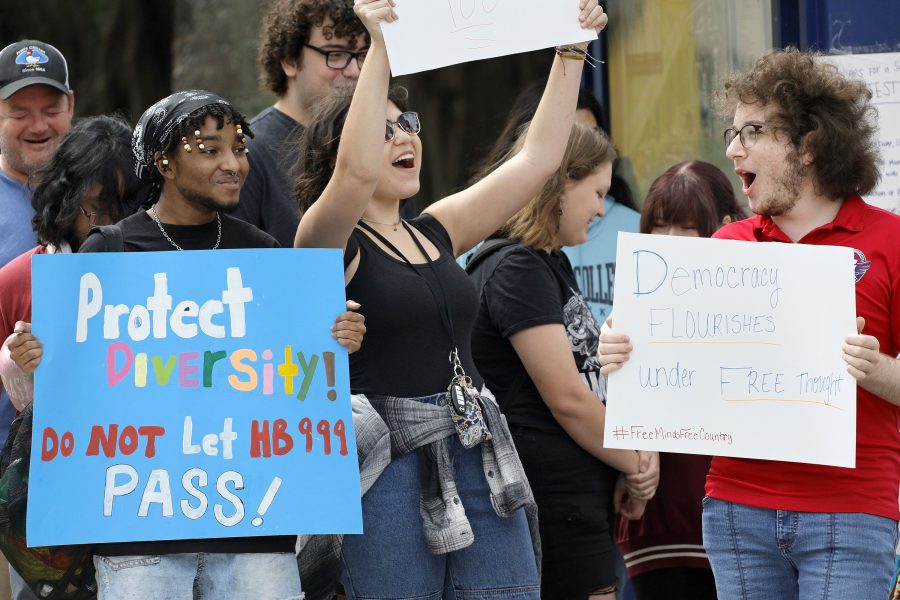Tribune News Service
Students voice their opposition to Florida House Bill 999 during a protest at the Kenneth R. Williams Administration Building at Florida Atlantic University in Boca Raton on Wednesday. Photo courtesy of Amy Beth Bennett/TNS.
Proposed Florida HB 999 to remove ‘diversity, equity and inclusion’ programs from public state universities
Following a slew of controversial house bills made in regard to education such as the now-passed House Bill 1, which expanded private school vouchers, Florida House Republicans are attempting to pass HB 999 under the name Public Postsecondary Educational Institutions.
HB 999 was first introduced to the Florida House of Representatives in late February by Republican Rep. Alex Andrade. He says the reasoning behind introducing the bill is to simply give proper representation to conservative voters who feel as if colleges are too focused on political indoctrination.
The bill seeks to end or extremely limit programs and majors that fall under the framework of diversity, equity and inclusion on public college campuses. Programs such as DEI-centric fraternities and sororities would fall under this definition, along with majors such as gender studies and critical race theory.
Other effects of the bill include modifying the powers and responsibilities of Florida’s public university Board of Governors, a 17-seat board with 14 of its members personally appointed by the governor of Florida. Under HB 999, this Board of Governors would have the ability to review the tenure of professors and other members of university faculty. Additionally, this board would be assigned with the responsibility of deciding whether or not a university’s mission aligns with “curriculum that promotes citizenship in a constitutional republic,” as the bill’s text itself says.
Reactions to HB 999 have been mixed, with support mainly being shown from the Republican party and supporters of Gov. Ron DeSantis. One such example can be seen with Education Secretary Manny Diaz, citing how he wants to avoid the pushing of ideologies onto students on college campuses.
Other proponents of the bill seem to be more focused on the inclusion of a more Western-centric curriculum, with the bill’s text having requirements such as humanities courses needing to include “Western Canon” and general education sources having to instruct on the United States’ founding documents such as the Federalist Papers “whenever applicable.”
Most critics and opposers to the bill are comprised of democrats and students respectively – the latter offering some commentary on who this bill is exactly for when considering the considerably large and uproarious student response. Many student bodies across the state have seen large student walkouts and protests, such as the large sit-in held at a University of South Florida board of trustees meeting.
USF is not the only university where this is occurring. At Florida Atlantic University a group of students also held a protest against HB 999 on Mar. 15, fighting against the restrictions and ending of majors such as sexuality, gender and women’s studies. This specific protest seemed to have a large impact and outreach, with the students holding the protests managing to secure a Zoom meeting with Florida state officials to discuss the bill.
Marjory Stoneman Douglas High School students have had a mainly negative reaction to HB 999 and its contest, a trend that follows the large upset seen in college students.
“I think that [House Bill 999] is a very thinly veiled attempt from the Florida legislature in the systemic institution of racism and homophobia,” junior Aisha Hashmi said. “With every new bill introduced by House Republicans, our government in Florida takes a step backward.”
These worries reflect one of many feelings of resentment towards the bill coming from MSD’s student body, with others falling along the lines of suppression of student expression and freedom of education.
“I think it is incredibly important to learn about the culture, history, and experiences of any identity or culture and [House Bill 999] is a clear attempt by the state of Florida to erase diversity and the history of marginalized communities,” sophomore Jakob Lusskin said.
He also mentions how the removal of certain majors and topics of learning such as Critical Race Theory and Critical Ethnic Studies impacts him as a Jewish man, and is another reason why he dislikes the bill.
MSD’s student body largely seems to feel the same in regards to this bill, with the main points of contention being which part of the bill they are least receptive to.
“I think if you censor education and don’t allow people to learn certain things, it’s limiting education,” junior Caleb Hebert said. “Having differences in opinion in education is important and limiting education due to opposing beliefs creates echo chambers which we want to avoid.”
Overall, the bill has seen an overall negative response from students all across the state, usually citing lack of freedom of education and overstepping from the state legislature. While the bill itself seems to align with Gov. DeSantis’ plan for education, it is unclear whether or not he will sign it.
